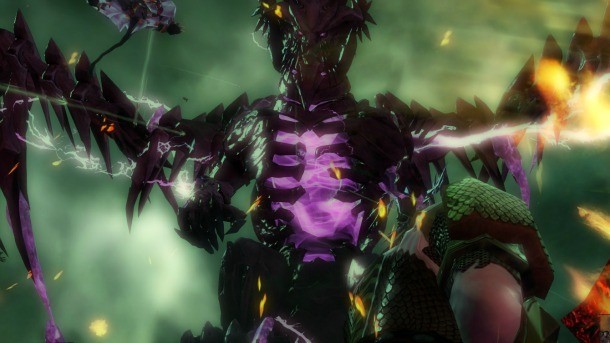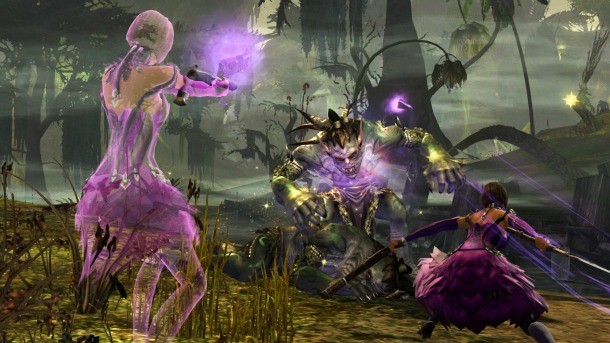Subscribe today to receive the next issue of Game Informer, featuring the Most Anticipated Games of 2026!
Guild Wars 2: The Best MMO I've Played In Years

Guild Wars 2 is the best MMO I’ve played in years. It’s not perfect, and it doesn’t turn genre convention on its ear as much as the pre-release rhetoric from NCsoft and ArenaNet might have led you to believe, but this ambitious and well-executed MMORPG artfully marries the twin design tenets of rewarding same-faction cooperation and providing hardcore, skill-based PvP competition.
[Editor's Note: Game Informer does not assign traditional review scores to MMOs given their constantly updating and changing nature. This column examines the game with a critical eye, and takes the place of a standard review.]
This is cast in the mold of the EverQuest/World of Warcraft lineage of MMORPGs, but with several key innovations. Some parts of the game, like the big-ticket World vs. World combat, are leagues beyond anything available in competing titles. Others, like the leveling process, are familiar but so dramatically improved over genre standards that you’ll have a hard time going back. ArenaNet’s unusual take on players’ personal storylines, on the other hand, is a half-baked shell of a feature that functions poorly. On balance, though, Guild Wars 2 is an exceptional game worth every penny of its sticker price and more, despite its lack of an ongoing subscription fee (see sidebar).
The incredible scale of the world is striking. Capital cities stretch out to the horizon. Handcrafted adventuring zones are packed full of content, and are as gigantic as they are numerous. ArenaNet has almost entirely avoided the cut-and-paste trap that some MMOs fall into; every corner you turn brings an arresting new vista full of unique visuals. From the overall art direction to the tiniest animation, Guild Wars 2 is one of the best-looking games I’ve ever played.
After the initial buzz from the presentation fades, a deeper and more permanent love affair with the mechanics is clear to take root. Combat is still a matter of pressing hotbar buttons, but the need to aim most attacks instead of having them automatically seek their targets lends battle a dynamic edge lacking in similar MMOs, even newer ones like Rift and Star Wars: The Old Republic. All but the most basic fights ask more of players than other MMORPGs do, from dodging out of nasty charge-up attacks to adapting tactics and skill priorities to each encounter.
The most impressive accomplishment of the combat and skill design is how it obviates the very idea of a “skill rotation” that is endemic to most other hotbar-combat MMOs. Picking the right time to hit your buttons is what makes a player skillful, rather than finding the “correct” build in an online guide and burning the optimal ability rotation into your muscle memory. Along with the ever-present emphasis on ground-targeted effects, positioning, and dodging, the combat and skill design invites players to keep their eyes on the battle instead of playing the interface.
I wasn’t sold on the idea of removing the traditional tanking and healing roles, especially as someone whose favorite content is difficult group dungeons and raids, but so far my earlier skepticism is proving unfounded. The concept of giving every player a heal skill and making everyone responsible for their own health bar is working out brilliantly. Having a decent mix of damage- and support-focused characters in a PvE or PvP group is still helpful, but the line is pleasantly blurry. I’m not convinced that dungeon-style content is plentiful or good enough to hold my interest in the long-term, but Guild Wars 2 makes up for that in many other ways.
How content is structured is as important to an MMO as good fundamental mechanics are. Guild Wars 2 follows the same blueprint in this regard: Determine the core goal that this style of MMORPGs have been chasing since their inception, and come up with a new, better approach. The results are excellent.
Guild Wars 2’s leveling experience is unparalleled. The dynamic event system takes the place of questing, and holds several advantages over traditional designs. The window dressing of a quasi-living world falls apart about halfway to level cap as you realize that the game effectively trades static spawns for longer, more scripted spawn cycles, but it’s still a superior system. More importantly, combining the dynamic missions with the ability to meaningfully engage in content without having to find a quest-giver is a wonderful change.

The content is good enough and so intertwined that it’s not uncommon to wander into an event (which the interface makes dead simple to do), be pulled into a series of further encounters and scenarios, and not notice until an hour later that you’ve trekked across most of the zone and gained a level and a half. The generous cooperation mechanics – you always get full credit for killing an enemy or completing a task, no matter if you started, finished, or helped a bit in the middle of other players also participating – mean that you’re always glad to see and work with other players. Larger events are basically pick-up raids, though like most leveling content they are tuned such that any old group of players can complete it without any meaningful communication.
Crafting, exploring, questing, and plain old fighting are all rewarded with copious amounts of loot and experience. Whatever activity strikes your mood or playstyle, you can make meaningful progress by engaging in it. Taken all together, leveling is a silky-smooth, enjoyable experience full of opportunities to scratch most MMO player itches from fighting tough one-on-one battles to exploring treacherous jumping puzzles.
The one black mark on Guild Wars 2 is the poorly written, shoddily executed, badly conceived personal story solo-instance adventures that sprinkle your journey from level 1 to 80. Having some control over the course of the tale is neat, but ultimately pointless when the story itself is this bad. I could forgive the middle-school D&D campaign dialogue and narrative if the missions were cool. Rather than helping storied heroes save the world, though, I have thus far found myself either cursing buggy scripting that makes it difficult or impossible to complete objectives, or bored to tears slogging through generic waves of enemies. In every case, I’ve done a lot of eye-rolling while fast-forwarding painful dialogue. The decision to include terrible single-player RPG bits in this otherwise brilliant MMO is a baffling one.
PvP is the final piece of the Guild Wars 2 puzzle, and it’s a big one. The ambitious World vs. World design is amazing. Servers battle each other on gigantic, persistent, open-world zones built specifically for large group combat complete with towering fortifications and powerful siege engines. WvW can be a bit of a crapshoot, as hooking up with a group doing something interesting is dependent on your server, the day of the week, and even time of day. When you do find a group (or even better, organize a crew of your own), the excellent combat mechanics make it some of the best PvP in the genre. Like everything else, engaging in WvW is amply rewarded with loot, experience (though everyone’s base stats are boosted to level-cap values in WvW), and achievements.
Structured PvP is a separate, e-sports flavored option where everyone has every skill unlocked and wears gear with equivalent stats on it. Matches are objective-based and take place on servers akin to the way a competitive shooter like Battlefield works. The progression hook is much weaker here, though, as the only rewards are cosmetic items for use in more structured PvP. And, of course, the all-important achievements and bragging rights that dedicated PvPers do it for.
Guild Wars 2 is a shining, impressive achievement that will shape the MMORPG space for years to come. The personal story is bad, yes, but that’s a tiny sliver of the overall package. The execution of the rest of the game is nearly flawless on a level that only a handful of studios have ever achieved, much less in a massively multiplayer setting. The ambitious and unique retooling of genre conventions reveals a level of thoughtfulness on ArenaNet’s behalf that only the top tier of game developers can aspire to. We’re going to be playing and talking about this one for a long time.
|
A Respectful Business Model In lieu of a monthly subscription fee, Guild Wars 2 has an in-game shop where items are sold for real-world currency to supplement the income provided by sixty-dollar box sales. Out of all the cash shops I’ve seen in online games, I like this one the best. Not only is it almost entirely avoidable if you don’t want to spend money (bank slots and bag slots are the only things I’d consider de-facto required), but the real-money currency is available for purchase with in-game currency. The exchange rate is dependent on the game-wide economy, but so far the effective gold prices for items and services have been comparable to the investment required for similar items in MMOs that lack cash shops entirely. Until and unless ArenaNet has a dramatic change of heart with regard to how it runs the cash shop, its inclusion is way more than a fair trade for the lack of a monthly fee. |









